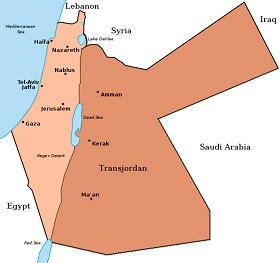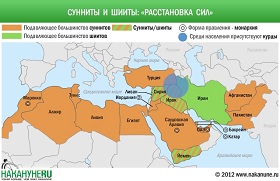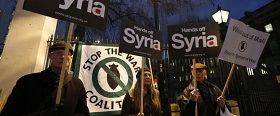Great Britain and Syrian Dilemma
(no votes) |
(0 votes) |
Ph.D. (Hist.), Senior Research Fellow, Research Fellow of the Center for Development and Security Studies, Faculty of World Politics, Moscow State University
The crisis in Syria, which has now been on the edge of civil war for two years, is at the center of the world’s attention, with the UK being one of the key stakeholders keen to achieve a peaceful settlement. Where does London stand in the Syrian conflict? What are the chances that the West, including the UK, will interfere to resolve the conflict? Are there any alternatives to a military scenario, what will happen in the mid-term in Syria, and what will Britain’s actions be on Syria?
The crisis in Syria, which has now been on the edge of civil war for two years, is at the center of the world’s attention, with the UK being one of the key stakeholders keen to achieve a peaceful settlement. Where does London stand in the Syrian conflict? What are the chances that the West, including the UK, will interfere to resolve the conflict? Are there any alternatives to a military scenario, what will happen in the mid-term in Syria, and what will Britain’s actions be on Syria?
UK Interests in Syria
Following closely world news, one cannot help but notice that the UK pays special attention to the conflict in Syria. UK authorities explain their interest in Syria from a desire to protect the rights of Syrian people, as represented by rebels, to a call for a peaceful democratic transition which President Bashar al-Assad’s regime is incapable of providing. The incumbent government, according to the UK, fully discredited itself when it resorted to aggression against the civilian population. This position stems largely from the increasingly popular “responsibility to protect”, a concept, which although recognized by the United Nations, is not part of international law.
At the same time, Britain has other interests in Syria and in the wider region.
To start with, Britain historically is known to have interfered in Syrian policy. In 1922, the League of Nation divided the Syrian territories of the Ottoman Empire, which collapsed following World War I, between France and Great Britain. The latter was given control over Jordan and Palestine and the former received what is today Syria and Lebanon (the so-called League of Nations Mandate). However, in the years that followed, Great Britain was always trying to expand its influence in the region, and resorted to different ways to oppose France. Archives made public recently suggest that in June 1945, Britain entered into a secret treaty with Syrian authorities, and then used force to help Syria gain independence from France. Syria had to accept British hegemony briefly, but only until 1948. These secret arrangements with Syrian President Shukri al-Quwatli pledged assistance in fighting France, gave a green light to UK interests in the country, and promoted the creation of Greater Syria in line with British plans to bring together Syria, Transjordan, Lebanon and Palestine, to be followed later by Iraq [1].
Britain has officially articulated its interests in Syria through:
- moral arguments: a desire to put an end to the suffering of the civilian population and bring a democratic government to power in Syria;
- concerns over instability in Syria, which is likely to spill over to countries in the neighbourhood, such as Lebanon, Jordan or Turkey;
- fears that power in Syria will be taken over by radical Islamists who are Assad’s sworn enemies today, together with worries that certain people with British passports or residence permit or EU passport holders with extremist attitudes having received training in Jihadist camps, would return to Europe with terrorist intentions. In this sense, Britain is worried about its own national security.
It appears that Britain is trying to present northern Syria’s Jihadist training camps (some run by Jabhat al-Nusrah li-Ahl al-Sham, or the Syrian People Support Front) as a threat to its national security.
The undisclosed British interests in Syria include:
- the interest that the UK and the West have in Middle Eastern countries, where they seek to strengthen their military, strategic and geopolitical positions;
- the strategic alliance with the US that too is concerned over the situation in Syria. The U.S. is using Britain to probe public opinion and hold talks with other parties to the Syrian process;
- the placement of a new, pro-Western government after Assad formed by the members of the opposition and expected to protect British interests in the country;
- the West is loathe to allow other non-Western actors, such as Russia or China, to strengthen further their influence and strategic positions;
- with Syrian conflict resolved in its favour, the West would gain added leverage against Iran, much to the benefit of the US and the UK.
- the West is keen to get access to, and control over, oil in the country.
The last point deserves some elaboration. Some observers believe that Britain is less concerned than France or the US by intraregional issues, but has a bigger interest in gaining control over energy flows (oil or gas) [2]. At the talks in the spring of 2012 in Damascus, energy and oil ministers from Syria, Iran, and Iraq approved plans for the expanded export of Irani and Iraqi oil and gas through Syria and from its Mediterranean sea ports. If implemented, these plans would even further enhance the major role that Syria plays on the European oil and gas market. The Kirkuk–Baniyas pipeline (running from Iraq to Syria) used to handle no less than 15 per cent of oil imports to EU countries [3]. Also, Syria effectively controls Saudi and Iraqi oil transit through the Lebanese seaports of Tripoli and Saida. Syria also produces oil, and almost 95 per cent of its production had been going to the EU until European countries agreed to ban Syrian oil imports in September 2011 (in the wake of the US’s decision [4]).
Together with Israel and Turkey, the West seeks control over the transit of Middle Eastern oil into Europe through Syria and Lebanon, although the Syrian leadership has turned down any offers by Western businesses which are looking for control over oil. This is one of the key reasons behind the growing pressure on Damascus by the West and regional players.
As before with Libya, in the conflict between Assad’s regime and the militants ongoing since the spring of 2011, the UK has sided with those who are discontent with the authorities, again appealing to the need to protect civilians. As in Libya, London’s purpose has been to force out the head of the state [5] and ensure a change in government.
In November 2012, the UK called into question the EU embargo on arms sales to any of the parties to the Syrian conflict, citing the need to provide rebels with arms “for self-defence” [6]. By late February 2013, the US and the UK agreed to increase financial aid and technical assistance to the rebels, and together with the EU they will be supplying them with armoured vehicles and non-lethal military equipment (uniforms, field glasses, equipment for night vision and telecommunication devices) [7]. But by 12-14 March 2013, the UK and France began urging EU leaders to review their embargo conditions. If they fail to persuade other EU countries to lift the embargo, the UK and France have already threatened to unilaterally supply arms to the Syrian opposition [8].
In November 2012 the United Kingdom recognized the Syrian opposition coalition as the only legitimate representatives of the Syrian people [9]. It also announced a readiness to conduct a military intervention in the Syrian conflict with the purpose of resolving it; this is a possibility that British authorities have not yet ruled out [10].
Syrian crisis and chance for settlement
Despite all the statements by the British concerning possible military involvement in the Syrian crisis, there are a number of factors which hamper direct intervention by the British (or the West) in the Syrian conflict under the Libyan scenario.
One of these factors is the position of Russia and China in the UN Security Council, and Russia’s help in reinforcing the Syrian defence sector, which we come back to later.
Secondly, with reduced defence spending in the UK, any future intervention (apart from limited airborne or logistical support) is highly unlikely [11].
Thirdly, such an intervention would require the active engagement by the US, and Americans would no longer be able to act using Britain and France as a shield, as what happened in Libya. In addition, the Obama Administration is not yet prepared to get itself mired in yet another Middle East conflict, given its lessons from Iraq and the permanent threat from Iran [12].
Because of all of this, Britain and the US have intensified their efforts to seek some compromise with other parties interested in seeing the Syrian crisis resolved through political means. This has resulted in resumed efforts by London and Washington to talk to Moscow.
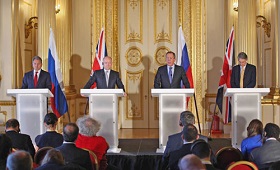
First Russia-UK ministerial meeting of 2+2
occurred: Sergei Lavrov, Sergei Shoigu,
William Hague, Philip Hammond
Throughout this conflict, Britain, acting as an active promoter of Western interests, has been busily engaged in diplomatic efforts in Moscow, trying hard, but not exactly succeeding, in making it look at the Syrian conflict through Western eyes. First, in September 2011, the British Prime Minister, David Cameron, visited Russia; in May 2012 his Foreign Secretary, William Hague, came to Moscow; and then the Russian President, Vladimir Putin, visited London for talks with the British Prime Minister. Throughout 2012, there were numerous Russian-British political consultations at the ambassadorial and foreign office level, and then in March 2013 the first Russia-UK ministerial meeting of 2+2 occurred: William Hague and Defence Secretary Philip Hammond held talks with their Russian counterparts Sergei Lavrov and Sergei Shoigu [13]. This could have been this last round of consultations that paved the way to the 7-8 May Russian-American negotiations between Lavrov and Kerry on Syria, where the parties resolved to convene an international conference in the near future about the settlement of the crisis in Syria.
Almost immediately after the visit of US Secretary of State John Kerry, David Cameron arrived in Sochi on 10 May to meet Putin. It is understood that Syria was again the key topic at this meeting. Both parties continue to have some significant differences, in particular, about the issue of continued Russian arms sales to the Syrian regime. However, as the British Prime Minister noted, “we share fundamental aims: to end the conflict, to stop Syria from fragmenting, to let the Syrian people choose who governs them, and to prevent the growth of violent extremism.” [14] Cameron also suggested that it was not enough just to bring the regime and opposition together at one negotiating table; Britain, Russia, America and other countries should also be there helping to shape a transitional government.
However, rumours spread in the Western political community and the mass media alleging that the Syrian regime had used chemical weapons against rebels, may be indirect evidence that some intervention was in the making. Israeli bombing of Syrian targets and Turkey’s Phantom reconnaissance plane flying over Syrian territory (it was hit down by Syrian air defences) [15] may also suggest that the probable future interventionists were trying to probe the strength of the defences and combat readiness and to identify weak links for their future plans of involvement using their own allies for the purpose.
A NATO-led armed intervention in Syria’s air space has a certain likelihood provided it is supported by the US. Syria would hardly be able to survive such an attack. Lieutenant General (Rtd.) Professor Anatoly Gavrilov in his contribution to the Natsionalnaya Oborona [National Defence] journal looks in-depth at the strengths and weaknesses of the Syrian air defense, which is very much obsolete. The author concludes that the air defence systems are still strong enough to cope with easier combat tasks (destroying single air targets or intruder aircraft; deflecting low-intensity airborne attacks with little jamming), but they are rather unlikely to be able to resist an enemy with advanced weaponry or to withstand an assault by the combined air forces of the Western coalition [16].
Russia and Britain and their differences on Syria
At the UN Security Council, France, Britain and the US have insisted on more severe sanctions against Bashar al-Assad’s regime, but Russia and China have been against them.
The UK even announced it was ready to intervene militarily in the Syrian conflict [17], but like any other country in the West, it would hardly be willing to try it in the absence of UN sanctions, whereas Russia and China will resist any UN resolution to this effect.
All this time Britain has been exerting diplomatic pressure on Russia to make it more well-disposed to Western projects for the crisis settlement in Syria [18]. However, Russian diplomats having learned their lessons after Libya, continued to stick hard to their line. Syria is one of the few allies for Russia in the Middle East.
Vitaly Churkin, Russia’s Permanent Representative at the United Nations, has pointed out that it was important for the West to realize that Syria is not like Libya, and, in contrast to Muammar Qaddafi, President Assad enjoys significant popular support. Bashar al-Assad has not made Qaddafi’s mistake of alienating the political elite, and has at his disposal properly armed forces that Libya did not. The Middle East is a very sensitive region, with tightly knotted interests of various groups and forces. Recognizing the high risk of destabilization in the region given an armed intervention in Syria, Russia believes that the Syrian conflict should be resolved only through political means, through negotiations involving all parties, and through a true nationwide dialogue [19].
Developments first in Libya and now in Syria demonstrate that rushed actions by the West seldom favour the civilian population or stability in the country and the region. Quite significant in that respect is the disapproving reaction by the United Nations to the EU’s move to allow sales of non-lethal military equipment to Syrian opposition militants.
Great Britain largely shares and supports American interests and positions as its key ally in the Middle East, while for the US, the main goal is to prevent growing influence from such actors as Russia and China.
The People’s Daily in China, commenting on the situation in Syria, pointed out that the true reason for the West to insist on Assad’s removal is actually a geopolitical move to weaken Iran and Russia’s influence in the Arab world. The newspaper states that China has no special interests in Syria, or at least no more than other countries have. At the same time, the paper goes on to say, “China and Russia have learned their lesson from the tragic developments in Syria, and will not allow the replication of the Syrian model in other regions, especially where they have particular interests, including Central Asia and other nearby regions.” [20]
As for Western plans to undermine Russia’s influence in the Arab world, it is important to remember that the UK and the US are seriously concerned by the presence of the Russian Navy’s stronghold in Syria (at the Tartus seaport) and its electronic eavesdropping post in Latakia [21], as well as by Russian-Syrian military cooperation.
According to the BBC Russian Service, back in 2010 Russia signed a contract with Syria to supply it with four batteries of Russian-made S-300 surface-to-air missile systems, and Russian officials have confirmed their intention to deliver the weapons to Damascus. Early in May, diplomats from Israel and some Western countries alleged, with concern, that Russia was preparing the delivery of these weapons to be shipped to Assad, which means Syria could offer more resistance to any attempts to introduce no-fly zones over the country or defend itself against air assaults now much advocated by politicians, especially in Britain and France [22].
It is exactly this Russian military assistance to Syria that makes some potential initiatives by the West a costly, lengthy and risky undertaking. Besides, according to the Guardian’s sources in December 2012 and as stated by Guy Ben-Ari, a senior fellow at the Washington-based Centre for Strategic and International Studies, there were military advisers in place to help upgrade air-defence systems, and casualties among them in the event of a military campaign might have unpredictable geopolitical implications [23]. Throughout 2012, Russia indirectly confirmed the allegations, while in August 2012, the RBC Agency stated: “The General Staff of the Russian Armed Forces confirmed that Russian military advisers had never left Syria and continued to be employed there.” “Why all this aggravation about Syria? All plans that we have there are being implemented. Nobody has run away, it’s business as usual,” Chief of the General Staff General Nikolay Makarov told to TV Rain [24].
But then in May 2013, Russia’s Nezavisimaya Gazeta ran the following story: “Military diplomatic sources have confirmed to us reports by the London-based newspaper Al-Quds Al-Arabi alleging that Russian S-300 anti-aircraft systems have been delivered to Syria together with Russian crew members. The reports say that deliveries were secretly shipped in the last two years. Now Syria has all four S-300 division air defence systems due to be supplied under the 2010 agreement [25]. Nothing is however known about the exact number of Russian military advisers in Syria.
Russian Foreign Minister Sergei Lavrov has insisted that Russia was not planning to sell but, in fact, has long ago sold and is completing deliveries under the approved contracts for anti-aircraft systems, which being defensive weaponry, are not prohibited under any international norms [26].
There are also reports alleging that in January 2012, Moscow agreed to supply Damascus with 36 Yak-130 trainer combat aircraft. Besides, as early as in December 2011, Russia delivered to Syria its K-300P Bastion mobile coastal defence systems with Yakhont anti-ship cruise missiles [27]. According to Italian Rinascita, these are cutting-edge missileswhich are practically impossible to neutralize on the way to the target [28]. These systems will be able to protect the entire Syrian coastal line against any attacks from the sea.
All of the above is a good demonstration of the fact that Russia is one of the key actors in the current developments in Syria. The recent visits by officials from London and Washington and the earlier bilateral consultations of Russian and the UK show that the West recognizes that without engaging with Russia and its position it will be impossible to resolve the Syrian crisis. Logically, should the West decide to intervene in the Syrian conflict, the new authorities, controlled by the West, would try to curtail Russia’s presence in the country.
Overall, the Western countries, particularly the US and its closest ally, Britain, are mostly concerned in Syria about their strategic military positions in the region, and their control over Syrian oil is the second most important concern. At the same time, by starting an open conflict with the Shiite Axis powers in the Middle East (Iran and Syria), Western nations are in danger of destroying even further the sensitive balance between Shiites and Sunnites in a region already undermined by the events in Iraq, thus complicating the situation even further.
Syria as a British dilemma and ways to resolve it
One of the columnists and editors of Financial Times, a prominent British war journalist, Max Hastings, in his comments on London’s policies vis-à-vis Syria, notes that the UK is leading the coalition of some Western governments, “which are increasingly eager to give military assistance to anti-Assad forces in Syria.” [29] He emphasized however that judging by the history since 1945, all Western military interventions have had either ill-judged intentions or unintended consequences. “Even when Western leaders were right about the shortcomings of foreign rulers, the replacements almost invariably proved stinkers.” So the author asks himself: “Why should Britain and France lead an immensely perilous charge into Syria?” when the US “flinches”? Hastings thinks that in a situation when David Cameron “… is coping inadequately with problems at home,” it would be better not to get mired in the Syrian risky undertaking, the more so as the British society has mixed feelings about it. According to public opinion polls [30] by YouGov in late March 2013, the majority of Brits are adamantly against any substantial intervention in the Syrian crisis. The respondents were only supportive of humanitarian aid to the civilian population in Syria (75 percent in Britain favoured aid) and protective clothes (helmets or bulletproof vests) for rebels fighting Bashir al-Assad (and even then only 48 per cent favoured this to 30 per cent of those opposed). Other alternatives to aid as suggested in the polls are listed below:
- sending defensive military supplies, such as anti-aircraft guns, to the anti-Assad troops: of those polled in Britain, 23 per cent supported, 50 per cent opposed;
- sending small arms such as hand guns to the anti-Assad troops: 18 per cent supported, 54 per cent opposed;
- sending full-scale military supplies such as tanks and heavy artillery to the Anti-Assad troops: 12 per cent supported, 64 per cent opposed;
- sending [British/French] troops to fight alongside the anti-Assad troops: 8 per cent supported and 75 per cent opposed.
The results for France [31] and the US [32] were similar.
Peter Kellner, journalist and president of the YouGov firm which conducted all three public opinion polls, noted that the British are treating the situation in Syria now quite differently than they did Libya two years ago. Then, “although public opinion was divided, supporters of military action outnumbered opponents at the outset; and Conservative voters backed Cameron by more than two-to-one. This time the Prime Minister will have his work cut out to persuade Tory voters, let alone the wider public,” that they must back Syrian rebels against Bashir al-Assad [33].
Interestingly, on 9 May 2013, the British Stop the War Coalition (a London-based public association founded in September 2001) sent an open letter to the Prime Minister urging him to abandon his interventionist policy towards Syria, reminding him that the majority of the British population disapproves of such actions by the government. The authors of the letter, one of whom is an MP, write: “We fear that the aim of those intervening is to change the face of the Middle East, by weakening the influence of Iran through attacking its allies such as the Syrian government and Hezbollah in Lebanon… We believe that it is for the people of the Middle East to decide their own future and that the Western powers have a record and history of intervention there which has been a key source of the region's problems. We also believe that majority opinion in Britain, according to recent polls, is against such intervention, especially if it is designed to effect regime change.” [34]
Going back to comments made by Max Hastings in the Financial Times, retreat on the Syrian issue by Mr Cameron is tantamount to losing the UK’s global role and withdrawing “into a Little England foreign policy posture”, which he is loathe to do. The author concludes that even if Britain succeeds in toppling the Assad regime, “this is unlikely to benefit British interests in the smallest degree. I would leave Syria’s neighbours to arm the rebels and confine our role to humanitarian aid.”
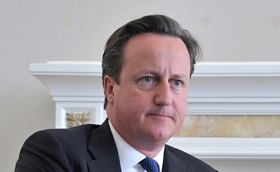
David Cameron: I want to help the Syrian
opposition to succeed and my argument is this:
Yes, there are elements of the Syrian opposition
that are deeply unsavoury, that are very dangerous,
very extremist, and I want nothing to do with them.
But there are elements of the Syrian opposition
who want to see a free, democratic, pluralistic
Syria that respects the rights of minorities,
including Christians, and we should be working
with them."
From Sky News Intervieew, June 16, 2013
Great Britain has interests of its own in Syria, which may not always coincide with those of other actors, such as the US, let alone other Middle East countries (Saudi Arabia or Qatar), or Turkey, Iran, Iraq or such great powers as Russia and China.
There is good reason for the UK to start looking for a political alternative to Syrian settlement, listen to the voices of other players and to heed their proposals. The approach tried previously in Libya was far from perfect, and replicating it in Syria may have catastrophic consequences. It would only escalate violence further, together with the danger that Western arms, already in the region, may fall into the hands of pro-Islamist, terrorist groups (for instance, the aforementioned al-Nusrah, Salafite militants or other Sunnite fighters). If the West fails to reach an understanding with Syrian rebels, or if they are to become disappointed with it, as has already partly happened, Syria may give rise to a retaliatory protest movement similar to al-Qaeda in Afghanistan. Then, the West will find it very difficult to control the situation in the region.
Russia’s approach to the Syrian conflict criticized by Britain is in fact prudent and pragmatic. Moscow condemns any violent actions, any human rights or international humanitarian law violations whichever side – Syrian government or armed opposition – commits them. The Russian leadership insists that the Syrian conflict must be resolved by the country’s citizens, without external intervention, whereas the international community could assist in political negotiations. Russia should continue to support peaceful resolution in Syria, working together with all parties concerned. Promoting its vision of the conflict resolution and adjusting its tactics in time, Russia could ensure the protection of its interests in Syria after a likely change of the regime there.
Great Britain could hope for a constructive relationship with Russia provided London stops suggesting such plans for the settlement that may harm Russia’s strategic and economic interest in Syria in future. Closer contacts between Russia and the UK recently may lay the groundwork for a more positive dialogue on a broad range of issues, including on the economy and security situation, but only if Great Britain refrains from any attempt to put pressure on its counterpart.
However, there is little chance that Britain will radically reverse its position. Despite verbal support for Barack Obama’s and Vladimir Putin’s initiative to convene a conference to try and resolve Syria’s problems, Great Britain has clearly and frankly made it known that, first, any settlement must presuppose Mr. Assad and his supporters’ retirement from the political scene. Secondly, Great Britain will continue to insist that the EU lift or soften its embargo on arms sales to Syria. In that case, the UK will start supplying arms to moderate rebels. It has already promised to double its deliveries of “non-lethal” materiel to rebels over the course of this year [35], although Britain had hoped that at the EU meeting on the embargo on 27 May 2013, it would have succeeded in changing it (if not cancelling it altogether) so that it would be open to supply arms and training to the Syrian national coalition. In a bid to persuade its EU partners, Britain circulated a discussion paper pointing to the continued deterioration of the situation in Syria, and suggesting possible options for amending the embargo [36]. True, Sweden and the Netherlands are against any attempts by Britain and France to amend the arms embargo.
The arms embargo against Syria was lifted, but Foreign Secretary Hague announced that the British government had so far no immediate plans to start arms deliveries to Syria. Nevertheless, according to William Hague, if the situation in Syria deteriorates, it will allow for a proper response in the future [37].
Britain’s dilemma towards Syria seems to be that London must have its own plans in Syria after Mr. Assad’s removal, but it may not be up to doing it all alone, whereas other players may not want to share its views and visions. Even its long-standing and closest ally, the United States, has to tread very cautiously in anything it does on Syria. At the same time many foreign observers argue that the plans of the British establishment are somewhat utopian. After the hypothetic toppling of President Assad, Syria is unlikely to become a stable democracy. It is much more likely to become mired in chaos due to squabbles among the local religious, political and ethnic groups and, as a result, the country will further damage the already undermined stability in the region where a broad range of actors have intertwined interests.
1. Zamir M. Britain's treachery, France's revenge. Haaretz Weekend edition [on the Internet]. – 1 February 2008. - URL: http://www.joshualandis.com/blog/britains-treachery-frances-revenge-by-meir-zamir/ (accessed 29.04.2013).
2. Muradyan I. Combination of interest in Syria (in Russian) [on the Internet]/ – 24 August 2012/ - URL: http://www.lragir.am/russrc/comments25924.html (accessed: 6/03/2013).
3. Baliev A. Oil spills from Syrian “scenario”: more on the actual plans of the “friends of Syria” (in Russian) [on the Internet] // Stoletiye. Publication by the Foundation for Historical Outlook. - 20 March 2012. - URL: http://www.stoletie.ru/geopolitika/neftanyje_patna_sirijskogo_scenarija_2012-03-20.htm (accessed: 6/03/2013).
4. EU banned import of Syrian oil (in Russian) [on the Internet] // BBC Russian Service. - 2 September 2011. - URL: http://www.bbc.co.uk/russian/international/2011/09/110902_syria_fresh_sanctions.shtml (accessed: 6/03/2013).
5. World leaders called on Syria’s president to resign (in Russian) [on the Internet] // BBC Russian Service. – 18 August 2011. - URL: http://www.bbc.co.uk/russian/international/2011/08/110818_syria_assad_call.shtml (accessed: 26/02/2013).
6. Watt N., Black I. Call to lift Syria arms embargo to aid rebels [on the Internet] // The Guardian. - 8 November 2012. - URL: http://www.guardian.co.uk/world/2012/nov/08/syria-arms-embargo-rebel (accessed: 6/03/2013).
7. Mohammed A., Oweis K.Y. West to send Syrian rebels aid, not arms [on the Internet] // Reuters. – 28 February 2013. - URL: http://uk.reuters.com/article/2013/02/28/uk-syria-crisis-conference-idUKBRE91R0RA20130228 (accessed: 6/03/2013).
8. Syria: UK's Cameron 'may veto EU arms embargo' [on the Internet] // BBC. -12 March 2013. - URL: http://www.bbc.co.uk/news/uk-politics-21763345 (accessed: 12/03/2013).
9. Britain recognizes Syrian opposition coalition (in Russian) [on the Internet] // RIA Novosti. – 20 November 2012. – URL: http://ria.ru/arab_riot/20121120/911483559.html (accessed: 6/03/2013).
10. Hope C. Britain could intervene militarily in Syria in months, UK's top general suggests [on the Internet] // The Telegraph. - 11 November 2012. - URL: http://www.telegraph.co.uk/news/worldnews/middleeast/syria/9670289/Britain-could-intervene-militarily-in-Syria-in-months-UKs-top-general-suggests.html#hash (accessed: 6/03/2013).
11. Kampfner J. Intervention Is Ever Harder to Resist but We Must // The Independent. - 26 December 2012. - URL: http://www.questia.com/read/1P2-34045097 (accessed: 29/04/2013).
12. Russian military presence in Syria poses challenge to US-led intervention. [on the Internet]. - 23 December 2012. - URL: http://www.guardian.co.uk/world/2012/dec/23/syria-crisis-russian-military-presence (accessed: 08.05.2013)
13. Britain – Russia: a 2 by 2 meeting of ministers. (in Russian) [on the Internet]. – 13 марта 2013. - URL: http://www.bbc.co.uk/russian/international/2013/03/130313_russia_britain_2_talks.shtml (accessed: 20/04/2013)
14. Britain and Russia agree on the need to put an end to the armed conflict in Syria. (in Russian) [on the Internet]. – 10 May 2013. - URL http://www.itar-tass.com/c1/732142.html (accessed: 10/05/2013).
15. Gavrilov A. Syria’s Air Defence: salvation or illusion? (in Russian) // Natsionalnaya oborona [on the Internet]. – August 2012. - URL: http://www.oborona.ru/includes/periodics/geopolitics/2012/1008/17389386/detail.shtml (accessed: 6/03/2013).
16. Op cit.
17. Hope C. Britain could intervene militarily in Syria in months, UK's top general suggests [on the Internet] // The Telegraph. - 11 November 2012. - URL: http://www.telegraph.co.uk/news/worldnews/middleeast/syria/9670289/Britain-could-intervene-militarily-in-Syria-in-months-UKs-top-general-suggests.html#hash (accessed: 6/03/2013).
18. London to put pressure on Russia in Syrian issue (in Russian) [on the Internet] // Rossiskaya Gazeta. – 20 November 2012. - URL: http://www.rg.ru/2012/11/20/london2-anons.html (accessed: 6/03/2013).
19. The West has failed to realize that Syria was not Libya. Transcript of Vitaly Churkin interview to the CNN (in Russian) [on the Internet]. - 13 February 2012. - URL: http://www.inosmi.ru/world/20120213/185775256.html (accessed: 6/03/2013).
20. Global Times: “a full-scale civil war” is a tragedy for Syrian people (in Russian) [on the Internet] // the People’s Daily online. - 14 June 2012. - http://russian.people.com.cn/95181/7845907.html (accessed: 29/04/2013).
21. Russian military presence in Syria poses challenge to US-led intervention. [on the Internet]. - 23 December 2012. - URL: http://www.guardian.co.uk/world/2012/dec/23/syria-crisis-russian-military-presence (accessed: 08/05/2013).
22. The West fears S-300 supplies to Syria. (in Russian) [on the Internet]. – 9 May 2013 - URL: http://www.bbc.co.uk/russian/international/2013/05/130509_russia_syria_s-300_concerns.shtml (accessed: 10/05/2013)
23. Russian military presence in Syria poses challenge to US-led intervention. [on the Internet]. - 23 December 2012. - URL: http://www.guardian.co.uk/world/2012/dec/23/syria-crisis-russian-military-presence (accessed: 08.05.2013)
24. General Staff: Russian military advisers continue to work in Syria. (in Russian) – 28 August 2012. - URL: http://top.rbc.ru/politics/28/08/2012/666734.shtml (accessed: 22/05/2013)
25. Mukhin V. Russian military specialists are already in Syria (in Russian) // Nezavisimaya gazeta [on the Internet]. – 16 May 2013. - URL: http://www.ng.ru/armies/2013-05-16/1_siria.html (accessed: 22/05/2013)
26. Semenova Yu., Polina I. Russia has no plans to sell S-300 systems to Syria. (in Russian). [on the Internet]. – 10 May 2013. - URL: http://www.itar-tass.com/c9/732158.html (accessed: 10/05/2013)
27. Russia supplies Syria, which is threatened by the West, “the most powerful and invincible weapons” (in Russian) [on the Internet]. – 2 December 2011. - URL: http://www.newsru.com/world/02dec2011/yahont.html (accessed: 08/05/2013)
28. Chetoni G. Il missile antinave Yakhont di fabbricazione russa // Rinascita. [on the Internet]. – 15 November 2011. - URL: http://www.rinascita.eu/index.php?action=news&id=11509 (accessed: 30/05/2013)
29. Hastings M. Case for a Little England stance on Syria // Financial Times. (in the internet) –21 April 2013. - URL: http://www.ft.com/intl/cms/s/0/e8f8366a-a6bb-11e2-885b-00144feabdc0.html (accessed: 5/05/2013)
30. Kellner P. Syria: Cameron, Hollande at odds with voters. YouGov official site [on the Internet]. – 21 March 2013. - URL: http://yougov.co.uk/news/2013/03/21/syria-cameron-hollande-odds-voters/ (accessed: 22/05/2013)
31. Kellner P. Syria: Cameron, Hollande at odds with voters. YouGov official site [on the Internet]. – 21 March 2013. - URL: http://yougov.co.uk/news/2013/03/21/syria-cameron-hollande-odds-voters/ (accessed: 22.05.2013). Note: the respondents were interviewed on 18-19 March 2013 in Great Britain and on 18-20 March 2013 in France.
32. Clark T. US and UK public reject stronger military support for Syrian rebels // The Guardian [on the Internet]. - 22 March 2013 - URL: http://www.guardian.co.uk/uk/2013/mar/22/us-uk-reject-stronger-syria-support/ (accessed: 22/05/2013). Note: the polls were conducted on 10,11,13,14 March 2013 in the UK, and on 12- 14 March 2013 in the US.
33. Kellner P. Syria: Cameron, Hollande at odds with voters. YouGov official site [on the Internet]. – 21 March 2013. - URL: http://yougov.co.uk/news/2013/03/21/syria-cameron-hollande-odds-voters/ (accessed: 22/05/2013)
34. Corbyn J., MP, German L. Letter to David Cameron: No UK intervention in Syria. Stop War Coalition official site [on the Internet]. – 9 May 2013. - URL: http://stopwar.org.uk/index.php/resources/stop-the-war-coalition-statements/2449-syria-letter-to-david-cameron-no-uk-intervention-in-syria (accessed: 22/05/2013)
35. Britain pushes for 'more flexibility' on EU arms embargo to Syria // The Telegraph. [on the Internet]. - 13 May 2013. - URL: http://www.telegraph.co.uk/news/worldnews/northamerica/usa/10054676/Britain-pushes-for-more-flexibility-on-EU-arms-embargo-to-Syria.html (accessed: 13/05/2013)
36. Blitz J. UK continues push to amend EU arms embargo on Syria // Financial Times. [on the Internet]. – 8 May 2013. - URL: http://www.ft.com/intl/cms/s/0/f6c47c04-b7f0-11e2-9f1a-00144feabdc0.html (accessed 9/05/2013)
37. Chaffin J. UK and France win battle to lift EU’s Syria arms embargo // Financial Times [on the Internet]. – 28 May 2013. - URL: http://www.ft.com/intl/cms/s/0/095e5e50-c6c1-11e2-8a36-00144feab7de.html#axzz2UXWUI0vK (accessed: 30/05/2013)
(no votes) |
(0 votes) |


